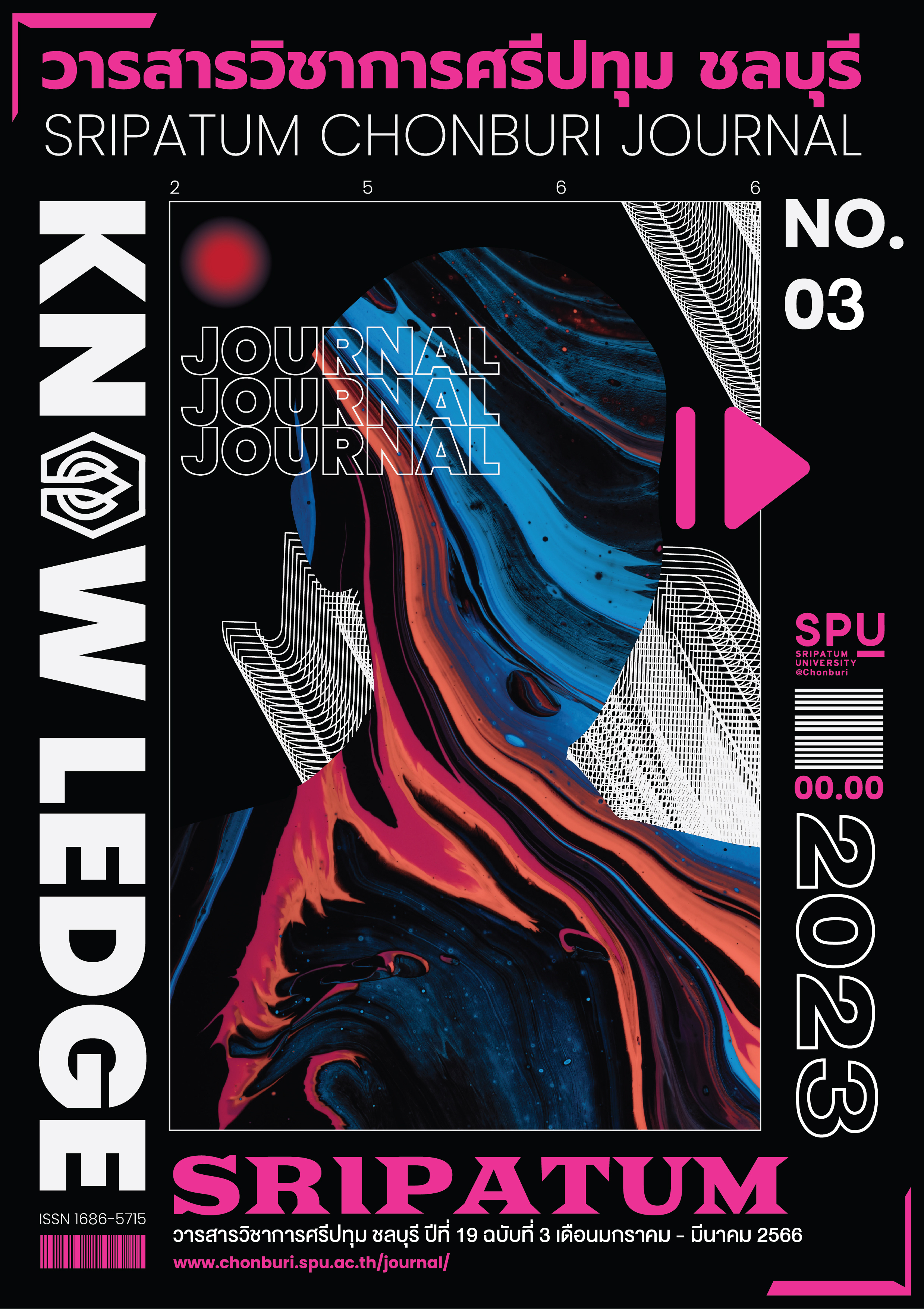A STUDY OF THE RELATIONSHIP OF FIVE-COMPONENT PERSONALITY AND SELF-ESTEEM OF FIRST YEAR PHYICAL THERAPY STUDENTS IN THE HEALTH LINE OF A HIGHER EDUCATION INSTITUTION ACADEMIC YEAR 2021
Keywords:
5-component personality traits, self-esteemAbstract
The objectives of this descriptive research were 1) to find the 5-component personality level and self-esteem of the first-year health students at a higher education institution, academic year 2021, 2) to determine the relationship between the 5-component personality type and their self-esteem. The samples gained by simple random sampling method, consisted of 36 first-year health physiotherapy students at a university in the academic year 2021. The tool was a 5-element personality test. The researchers used the 5-element personality test to test with physical therapy students in Bangkok similar to the sample group to find the reliability again. The reliability was equal to .92 and the self-esteem scale, the research team determined content validity by examining the content's consistency with the objectives and operational definitions and using Cronbach's α-Coefficient to obtain a reliability equal .88. Data were analyzed by percentage, mean, standard deviation, and Pearson's correlation coefficient. The results showed that 1) 1st year physical therapy health students at a higher education institution, academic year 2021, had a level of self-esteem, openness to experience, conscientiousness, and agreeableness personality at a high level, and had a level of extraversion and neuroticism personality at a moderate level. 2) Regarding the relationship, self-esteem was found to have a statistically significant positive correlation at the .01 level, including openness to experience, conscientiousness and extraversion personality types (r=.52**,.72*.*, and .50**), neurotic personality had a statistically significant negative effect at the .05 level (r=-.37*). and no relationship was found with the agreeable personality.
References
คัคนางค์ มณีศรี. (2560). อิทธิพลส่งผ่านการเห็นคุณค่าในตนเองต่อความสัมพันธ์ระหว่างบุคลิกภาพ 5 องค์ประกอบ และความพึงพอใจ
ในชีวิต. วารสารวิธีวิทยาการวิจัย, 30(1), หน้า 1-14.
พรพรรณ มากบุญ. (2555). ปัจจัยที่มีอิทธิพลต่อทักษะทางสังคมของเด็กและเยาวชนชายในศูนย์ฝึกและอบรมเด็กและเยาวชน เขต 2
จังหวัดราชบุรี. วารสารวิทยบริการ มหาวิทยาลัยสงขลานครินทร์, 24 (4), หน้า 114-125.
ภิญญู อุยะนันทน์ และคณะ. (2554). ความสัมพันธ์ระหว่างบุคลิกภาพแบบห้าองค์ประกอบและการเห็นคุณค่า. กรุงเทพฯ: คณะจิตวิทยา
จุฬาลงกรณ์มหาวิทยาลัย.
อดิศร วงค์เมฆ, สมพร สุทัศนีย์ และเสรี ชัดแช้ม. (2550). การสร้างมาตรวัดบุคลิกภาพห้าองค์ประกอบตามโมเดล OCEAN ของคอสตา
และแมคเครสำหรับนักเรียนชั้นมัธยมศึกษาตอนปลาย. วารสารวิจัยและวัดผลการศึกษา มหาวิทยาลัยบูรพา, 5(1), หน้า 33-47.
อภันตรี สาขากร. (ม.ป.ป.). เสริมสร้างความรู้สึกเห็นคุณค่าในตนเอง (ออนไลน์). เข้าถึงได้จาก:
https://www.manarom.com/blog/improving_self_esteem.html [2564, 24 มิถุนายน].
Allport, Gordon Willard., & Odbert, Henry Sebastian. (1998). Personality: A psychological interpretation. New York,
NY: Holt Rinehart & Winston.
Best, J. W. (1981). Research in Education (4th ed). New Delhi, NJ: Prentice-Hall.
Branden, Nathaniel. (1969). The Psychology of Self-Esteem. Los Angeles, CA: Nash.
Cattell, Raymond B. (2020). The Wiley-Blackwell Encyclopedia of Personality and Individual Differences. New York,
NY: Wiley-Blackwell.
Coopersmith, S. (1981). SEI Self-Esteem Inventories Manual. Redwood City, CA: Mind Garden.
--------------. (1984). SEI: Self-esteem Inventories. CA: Psychologist Press.
Costa Jr, P.T., & McCrae, R. R. (1992). The five-factor model of personality and its relevance to personality disorders.
Journal of Personality Disorders, 6(4), pp. 343-359.
Costa, P.T. (2008). Personality Disorders and the Five-Factor Model of Personality. New York, NY: Guilford.
Krejcie, R.V., & Morgan, D.W. (1970). Determining sample size for research activities. Educational and psychological
measurement, 30(3), pp. 607-610.
Marshall, Tara C., Lefringhausen, Katharina., & Ferenczi, Nelli. (2015). The Big Five, self-esteem, and narcissism
as Predictors of the topics people write about in Facebook status updates. Personality and Individual
Differences, 85, pp. 35-40.
McCrae, R. R. (2001). Mainstream Personality Psychology and the Study of Religion. Journal of Personality. 67(6),
pp. 1209-1218.
Mruk, C. J. (2013). Self-esteem and positive psychology: Research, theory, and practice. New York, NY: Springer.
Varanarasama, E., Kaur, A., Singh, G., & Muthu, K.N. (2018). The Relationship between Personality and Self Esteem
towards University Student in Malaysia. Advances in Social Science. Education and Humanities Research
(ASSEHR), (304), pp. 410-414.
Downloads
Published
Issue
Section
License
Copyright (c) 2023 วารสารวิชาการศรีปทุม ชลบุรี Sripatum Chonburi Journal

This work is licensed under a Creative Commons Attribution-NonCommercial-NoDerivatives 4.0 International License.
บทความทุกบทความเป็นลิขสิทธิ์ของวารสารวิชาการศรีปทุม ชลบุรี



